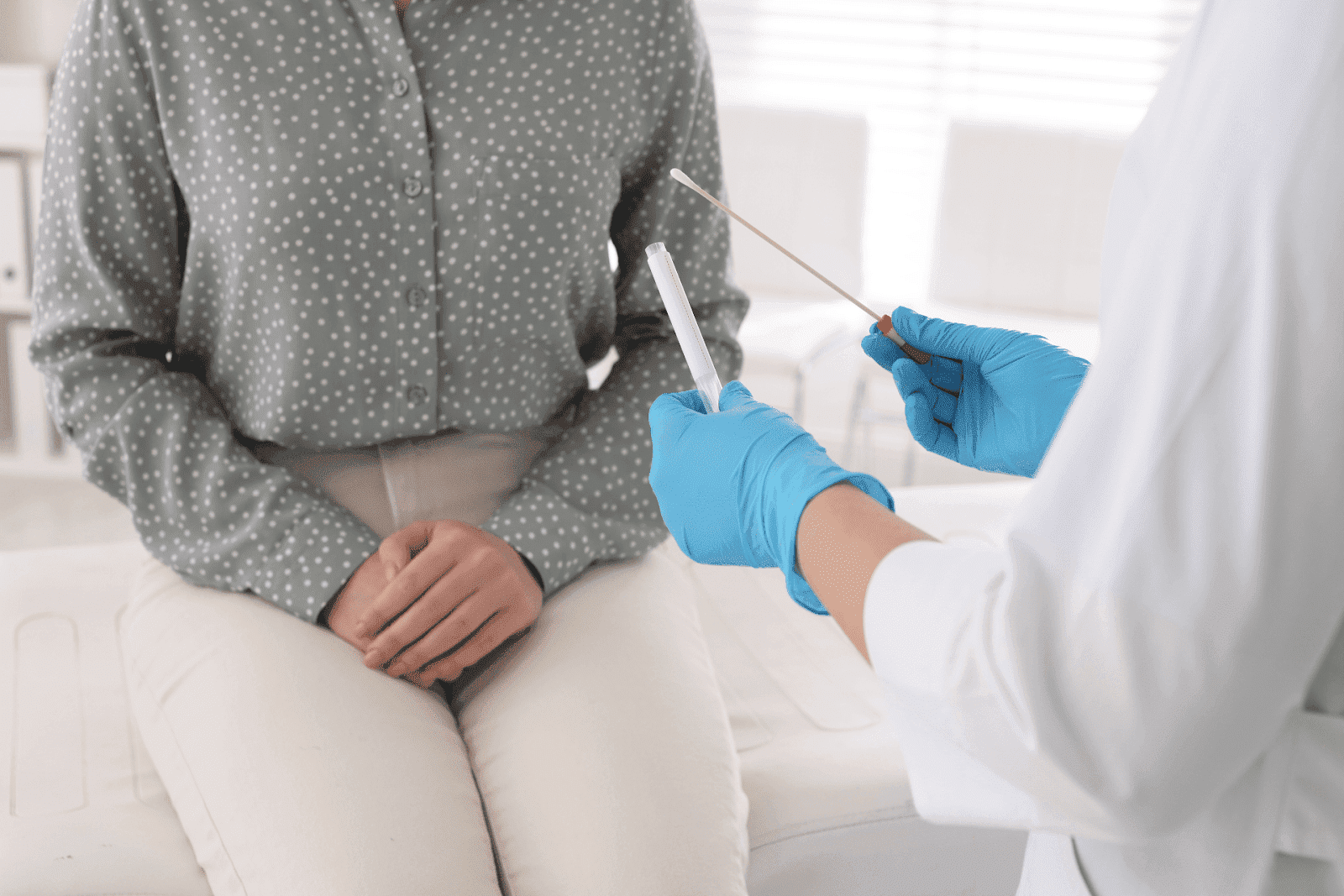Can You Get Chlamydia Without Having Sex?
Chlamydia is one of the most common sexually transmitted infections (STIs) worldwide, affecting millions of people each year. It is often associated with sexual activity, but [...]
Read More
Medically reviewed by Alan Lucks | MD, Alan Lucks MDPC Private Practice - New York on October 13th, 2025.
Mother-to-child transmission during vaginal delivery can infect newborn's eyes and lungs, causing conjunctivitis or pneumonia in 25-50% of exposed babies.
Up to 80% of women and 50% of men with the infection show no symptoms, allowing unknowing transmission to partners for months or years.
Untreated cases can lead to pelvic inflammatory disease in 10-15% of women, potentially causing permanent fallopian tube scarring and infertility.
A single course of azithromycin (1g dose) or doxycycline (100mg twice daily for 7 days) cures over 95% of infections when taken as prescribed.
CDC recommends annual screening for all sexually active women under 25 and older women with risk factors like new or multiple partners.
Chlamydia is one of the most common sexually transmitted infections (STIs) worldwide, affecting millions of people each year. It is often associated with sexual activity, but a question that arises frequently is whether it is possible to contract chlamydia without having sex. Understanding how chlamydia is transmitted, its symptoms, and prevention methods is crucial for maintaining sexual health and overall well-being.
 What Is Chlamydia?
What Is Chlamydia?Chlamydia is a bacterial infection caused by Chlamydia trachomatis. It primarily infects the genital tract, but it can also affect the rectum, throat, and eyes. The infection is often asymptomatic, meaning many people who have it do not show symptoms but can still spread it to others.
When symptoms do appear, they may include unusual discharge, burning during urination, or pain in the lower abdomen. If left untreated, chlamydia can lead to serious complications such as pelvic inflammatory disease (PID), infertility, and increased risk of contracting other STIs, including HIV.
Chlamydia is one of the most common sexually transmitted infections (STIs) worldwide, affecting millions of individuals each year. It is particularly prevalent among young adults and adolescents, largely due to factors such as lack of awareness, inconsistent condom use, and limited access to healthcare services. Regular screenings are crucial, especially for sexually active individuals under the age of 25, as early detection can significantly reduce the risk of complications and transmission to partners.
In addition to its physical health implications, chlamydia can also have psychological effects on those affected. The stigma surrounding STIs can lead to feelings of shame, anxiety, or depression, which may discourage individuals from seeking treatment or discussing their sexual health openly. Education and awareness campaigns are essential in breaking down these barriers, promoting safe sex practices, and encouraging individuals to get tested regularly, thereby fostering a healthier community overall.
Chlamydia is primarily transmitted through sexual contact. This includes vaginal, anal, and oral sex with an infected partner. The bacteria spread through contact with infected bodily fluids, such as semen or vaginal secretions. The prevalence of chlamydia highlights the importance of safe sex practices, including the use of condoms, which can significantly reduce the risk of transmission. Regular testing is also crucial, especially for sexually active individuals, as many people with chlamydia do not exhibit symptoms, making it easy to unknowingly spread the infection.
It is important to note that chlamydia is not transmitted through casual contact like hugging, kissing, or sharing utensils. The infection requires mucous membrane contact with infected secretions, which typically occurs during sexual activity. This characteristic of the bacteria underscores the necessity for open communication between partners regarding sexual health and history, as well as the importance of routine screenings to catch any infections early before they lead to more serious health issues.
While sexual contact is the main mode of transmission, many people wonder if chlamydia can be caught without engaging in sexual intercourse. The answer is that it is extremely rare but not entirely impossible under certain conditions. Understanding these rare scenarios can help demystify the infection and encourage preventative measures.
Non-sexual transmission of chlamydia could theoretically happen through:
Mother to child during childbirth: An infected mother can pass chlamydia to her baby during delivery, potentially causing eye infections or pneumonia in the newborn. This emphasizes the importance of prenatal screenings and treatment for expectant mothers to prevent complications for their infants.
Contact with contaminated objects: Though highly unlikely, sharing sex toys or towels that have not been properly cleaned could transmit the bacteria. This highlights the need for proper hygiene practices, such as cleaning sex toys thoroughly after use and avoiding sharing personal items that may come into contact with bodily fluids.
Oral contact: Kissing alone is not considered a risk, but oral sex with an infected partner can transmit chlamydia to the throat. This can lead to a condition known as pharyngeal chlamydia, which may go unnoticed without symptoms but can still pose a risk for further transmission.
Overall, the chances of contracting chlamydia without sexual contact are very low. The infection is almost always linked to sexual exposure. However, awareness of these rare transmission routes can help individuals take comprehensive steps to protect themselves and their partners, reinforcing the importance of education and preventive measures in sexual health.
Knowing how chlamydia spreads helps in taking appropriate precautions and reducing stigma. Many people feel embarrassed or ashamed when diagnosed with an STI, but understanding the facts can promote responsible health decisions.
For example, if someone believes chlamydia can be caught casually, they might avoid seeking testing or treatment out of fear or confusion. Conversely, recognizing that sexual activity is the primary risk factor encourages safer sex practices and regular screening.
Because chlamydia often shows no symptoms, regular testing is essential, especially for sexually active individuals. Testing is simple and can be done through urine samples or swabs. Early detection allows for prompt treatment, which usually involves a course of antibiotics.
Telehealth services like Doctronic.ai offer convenient and affordable options for chlamydia testing and consultation. With access to board-certified doctors 24/7, patients can receive guidance and prescriptions without leaving their homes. This is particularly valuable for those who may feel hesitant to visit a clinic in person.
Because many people with chlamydia do not experience symptoms, the infection can go unnoticed and untreated. When symptoms do occur, they may include:
Abnormal vaginal or penile discharge
Burning sensation during urination
Pain during intercourse
Lower abdominal or pelvic pain
Rectal pain or discharge (if infected through anal sex)
If untreated, chlamydia can cause serious health issues. In women, it may lead to pelvic inflammatory disease, which can result in chronic pelvic pain, ectopic pregnancy, or infertility. In men, it can cause epididymitis, an inflammation of the tube that carries sperm, which may affect fertility.
Prompt treatment is effective and usually cures the infection completely. This underscores the importance of early diagnosis and medical care.
Preventing chlamydia involves a combination of safe sex practices, regular testing, and open communication with sexual partners. Key prevention methods include:
Using condoms consistently: Condoms significantly reduce the risk of transmission during vaginal, anal, and oral sex.
Limiting the number of sexual partners: Reducing the number of partners can lower exposure risk.
Regular STI screening: Routine testing helps detect infections early, even when symptoms are absent.
Open communication: Discussing sexual health and STI status with partners encourages safer behaviors.
For those seeking medical advice or testing without the hassle of in-person visits, Doctronic.ai provides a modern telehealth solution. This service offers affordable video visits with licensed doctors across all 50 states, making it easier than ever to get care when needed.
If you suspect you might have chlamydia or have been exposed to someone diagnosed with the infection, it is important to seek medical evaluation promptly. Early treatment prevents complications and reduces the chance of spreading the infection to others.
Symptoms such as unusual discharge, pain during urination, or pelvic pain warrant a medical consultation. Even in the absence of symptoms, routine screening is recommended for sexually active individuals, especially those under 25 or with multiple partners.
Telehealth platforms like Doctronic.ai offer a discreet, fast, and reliable way to get medical advice, testing referrals, and prescriptions for treatment. This approach helps overcome barriers such as stigma, time constraints, or lack of local healthcare access.
 Summary
SummaryChlamydia is a common STI that is almost exclusively transmitted through sexual contact. While non-sexual transmission is theoretically possible, it is very rare. Understanding how chlamydia spreads, recognizing symptoms, and practicing prevention are essential for sexual health.
Regular testing and timely treatment can prevent serious health complications. Telehealth services such as Doctronic.ai provide accessible and affordable care options, making it easier than ever to manage sexual health responsibly and confidentially.
Taking control of your health starts with knowledge and action. If you have questions or concerns about chlamydia or other sexual health issues, consider reaching out to a trusted healthcare provider through telehealth or in person for personalized care.
Don't let uncertainty about sexual health linger. With Doctronic, you get the fastest, most personalized medical advice at your fingertips. Our AI Doctor is ready to provide you with quality care based on the most current, peer-reviewed medical research, ensuring you receive the most accurate information and treatment recommendations. Experience the future of healthcare with our free AI doctor visits and affordable telehealth video visits, available 24/7 in all 50 states. Join over 10 million satisfied users who have chosen Doctronic for their healthcare needs. Skip the line. Talk to an AI Doctor Now, for free.
While non-sexual transmission is extremely rare, sexual contact accounts for nearly all cases, making regular testing crucial since most people have no symptoms. Early antibiotic treatment provides complete cure and prevents serious complications like infertility. If you're concerned about exposure or need guidance on testing, Doctronic can provide personalized recommendations.
Chlamydia is one of the most common sexually transmitted infections (STIs) worldwide, affecting millions of people each year. It is often associated with sexual activity, but [...]
Read More